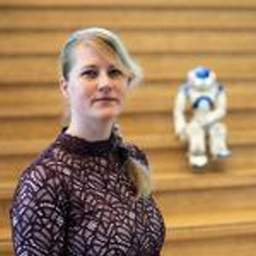
Maartje de Graaf
Profile
I am an Assistant Professor at the department of Information and Computing Sciences at Utrecht University, The Netherlands. Before starting at Utrecht University, I was a postdoctoral researcher affiliated with the Department of Communication Science at University of Twente and later Brown University’s Humanity Centered Robotics Initiative. I have a Bachelor of Business Administration in Communication Management (2005), a Master of Science in Media Communication (2011), and a PhD in Communication Science and Human-Robot Interaction (2015).
I am a communication scientist working in the multidisciplinary field of human-robot interaction. My research is motivated by my intrinsic drive to understanding human behavior and its underlying psychological and cognitive processes. Since computer technologies increasingly interact with us through complex and humanlike interfaces, the psychological aspects of our relationships with them are gaining an ever more vital role. Recent technologies, such as social robots, provide increasingly sophisticated simulations of social agency and are designed explicitly to provoke social and emotional responses from their users. As these technologies are becoming technically feasible for application in real-world contexts, everyday living is transformed in unprecedented ways. To examine this transformation, my research is guided by the following questions:
- What processes underlie people’s social, emotional and cognitive responses to interactive technologies, especially social robots?
- To what extent do these processes during human-technology interaction align with or divert from the processes during human-human interaction?
- How should the ethical and societal implications that may arise from people’s responses to interactive technologies, and social robots specifically be addressed?
- How can we influence technology design and policy to develop socially acceptable and beneficial robots?
Unraveling the social aspects of human-robot interaction and to what extent human psychological processes transfer into our interactions with artificial agents become vital in understanding co-habitation and collaboration between humans and robots.